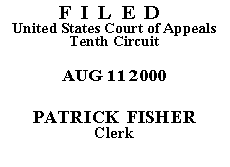

| CHRISTOPHER A. COSPER,
Plaintiff-Appellant, v. KENNETH S. APFEL, Commissioner, Social Security Administration, Defendant-Appellee. |
|
Plaintiff applied for disability insurance and supplemental security income benefits under the Social Security Act. The Commissioner denied benefits initially and upon reconsideration. Thereafter, plaintiff requested a hearing before an administrative law judge (ALJ), who found that plaintiff was not disabled at step five of the sequential analysis. See Williams v. Bowen, 844 F.2d 748, 750-52 (10th Cir. 1988) (detailing five-step analysis). The Appeals Council denied review, thus making the ALJ's decision the final decision of the Commissioner.
Plaintiff sought judicial review, and the district court affirmed the ALJ's decision based on this court's decision in James v. Chater, 96 F.3d 1341, 1344 (10th Cir. 1996). Plaintiff now appeals the district court's affirmance of the Commissioner's denial of his application for benefits. In light of the Supreme Court's recent decision in Sims v. Apfel, 120 S. Ct. 2080, 2083-85, 2086 (2000), we do not base our affirmance on administrative waiver, but, instead, we affirm the Commissioner's denial of benefits on the merits.
On appeal, we review the record to determine if it contains substantial evidence to support the Commissioner's decision and if the correct legal standards were applied. See Kepler v. Chater, 68 F.3d 387, 388 (10th Cir. 1995). "Substantial evidence is adequate relevant evidence that a reasonable mind might accept to support a conclusion." Id. at 388-89.
Plaintiff argues that the record does not contain substantial evidence to support the ALJ's finding that plaintiff retained the residual functional capacity to perform the unskilled jobs listed by the vocational expert. He maintains that this is so because the record does not contain substantial evidence to support the ALJ's finding that plaintiff had a limited education, and all the jobs listed by the vocational education are qualified by the Dictionary of Occupational Titles as requiring a limited, as opposed to marginal, education.
The record shows that plaintiff attended school through the ninth grade. The agency's regulations state that an individual with a seventh to eleventh grade education is generally presumed to have a limited education. 20 C.F.R. § 404.1564(b)(3). There is nothing in the record that indicates this presumption should not apply. In fact, the record shows that plaintiff filled out several applications in connection with his claim for benefits in a manner consistent with having a limited education. In addition, the record contains substantial evidence of education obtained through past work experience. See id. § 404.1564(a) (stating that past work experience, as well as daily activities and hobbies, may show that an applicant has intellectual abilities despite lack of formal schooling). Plaintiff stated that, in his past work, he was required to "writ[e], complete reports, or perform similar duties," as well as perform supervisory duties. Appellant's App., Vol. II at 70.
In sum, the record contains substantial evidence in support of the ALJ's finding that plaintiff had a limited education and retained the residual functional capacity to perform the sedentary, unskilled jobs listed by the vocational expert. AFFIRMED.
Entered for the Court
Circuit Judge
*. This order and judgment is not binding precedent, except under the doctrines of law of the case, res judicata, and collateral estoppel. The court generally disfavors the citation of orders and judgments; nevertheless, an order and judgment may be cited under the terms and conditions of 10th Cir. R. 36.3.